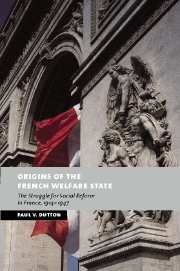Book contents
- Frontmatter
- Contents
- List of figures
- List of tables
- Acknowledgments
- List of abbreviations
- Introduction
- 1 An industrial model of family welfare
- 2 A mutual model for social insurance
- 3 Battle for control of social welfare: workers versus employers
- 4 Parliament acts
- 5 Challenges from city and countryside, 1930–1939
- 6 Retrenchment and reform, 1939–1947
- Conclusion
- Bibliography
- Index
3 - Battle for control of social welfare: workers versus employers
Published online by Cambridge University Press: 13 July 2009
- Frontmatter
- Contents
- List of figures
- List of tables
- Acknowledgments
- List of abbreviations
- Introduction
- 1 An industrial model of family welfare
- 2 A mutual model for social insurance
- 3 Battle for control of social welfare: workers versus employers
- 4 Parliament acts
- 5 Challenges from city and countryside, 1930–1939
- 6 Retrenchment and reform, 1939–1947
- Conclusion
- Bibliography
- Index
Summary
Employer control of family allowances and parliament's consideration of social insurance prompted rancorous debates within the working class. Union leaders failed to stop the family allowance movement because at virtually every turn they were confounded by divisions among their own rank and file. Workers with large families supported employers' payment of allowances. Indeed, they sometimes called on their syndicate chiefs to exert pressure on their employer to affiliate with a caisse de compensation. This division in the working class was exacerbated in 1919 with the creation of a new union based on social Catholic ideals, the Confédération Française des Travailleurs Chrétiens (CFTC). The 1920 Congress at Tours, where the French left split into rivaling socialist and communist parties further fragmented the working class on the question of social welfare. Two workers' unions emerged: the old CGT that remained allied with the socialists and the newly founded, pro-Soviet Confédération Générale du Travail Unitaire (CGTU). Although the CGT and CGTU leaderships fought together against employer-controlled family allowances, they attacked each other bitterly over the question of social insurance. The CGT sided with mutual leaders in support of social insurance. But leaders of the new CGTU, alongside communist deputies, denounced the Chamber-approved measure as a capitalist deception.
Employers exhibited more unity than their union adversaries did, but they too were wracked by a serious split. The rift emanated from the recovered territories of Alsace-Lorraine where German-style social insurance enjoyed the widespread support of industrialists.
- Type
- Chapter
- Information
- Origins of the French Welfare StateThe Struggle for Social Reform in France, 1914–1947, pp. 66 - 96Publisher: Cambridge University PressPrint publication year: 2002

